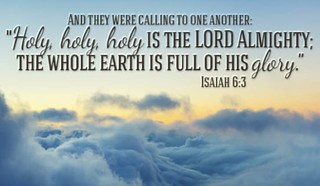- Recent Translations
- All Translations
Isaiah 6:13
Share
Settings
Isaiah 6:13 Meaning and Commentary
But yet in it [shall be] a tenth
Which some understand of ten kings that should reign over Judah from this time, the death of Uzziah, unto the captivity, as Jarchi and Aben Ezra observe; and which are, as Kimchi reckons them, as follows, Jotham, Ahaz, Hezekiah, Manasseh, Amon, Josiah, Jehoahaz, Jehoiakim, Jehoiachin, Zedekiah; but the prophecy, as we have seen, respects not the captivity of the Jews in Babylon, but their present one; wherefore the words are to be understood of a few persons, a remnant, according to the election of grace, that should be called, and saved amidst all the blindness, darkness, and destruction that should come upon that people; and may be illustrated by the words of the apostle in ( Romans 11:5 ) and these chosen, called, and saved ones, are the "tenth", that is, the Lord's tenth, as the words may be rendered F18. To this sense the Targum agrees,
``and there shall be left in it righteous persons, one out of ten;''though indeed the Christians were not left in Jerusalem when it was destroyed, but were called out of it just before, and were preserved from that ruin. And [it] shall return, and shall be eaten;
or "be for burning". I should choose to render it, "it shall return, and be burnt" F19; that is, it shall be burnt again; it was burnt a first time by Nebuchadnezzar king of Babylon, and his army, ( Jeremiah 52:13 ) and a second time by Titus Vespasian, to which this prophecy refers: as a teil tree, and as an oak, whose substance [is] in them, when
they cast [their leaves];
the word "Beshallecheth", which we render, "when they cast their leaves", is by some, as Jarchi, Aben Ezra, and Kimchi observe, thought to be the name of a gate in Jerusalem, called "Shallecheth", from which a causeway went towards the king's palace, from whence it had its name, ( 1 Chronicles 26:16 ) and along which causeway, as is supposed, were planted teil trees and oaks, which are here referred to. But the Targum, Jarchi, and Kimchi, interpret the word as we do, of casting their leaves: and the sense seems to be this; that as the teil tree and oak, when they cast their leaves in autumn, and look as if they were dry, withered, and dead, yet have a substance in them, and in spring appear alive and green, and flourishing again; so the Jews, notwithstanding their miserable destruction by the Romans, when they were stripped of all their riches and glory, yet were not utterly consumed as a people, but remained an entire distinct people, and do so to this day, among the nations of the world; though, like a dry withered trunk of a tree, without verdure or beauty; the reason of this follows: so,
or "because", the holy seed [shall be] the substance thereof;
that is, they shall subsist, or continue a distinct people, though in this miserable condition; because there is a "holy seed", or a certain number, whom God has chosen to be holy, that is to arise from them, and will be called and converted in the latter day; hence they have a substance, a subsistence, and shall remain till that comes, and that chosen remnant is called and saved, ( Romans 11:25 Romans 11:26 ) . The Targum is,
``as the elm and oak, when their leaves fall, and are like to dry "trees", and yet are moist to raise up seed from them; so the captivities of Israel shall be gathered, and shall return to their land; for the seed which is holy is their plantation.''Some, interpreting the passage of the Babylonish captivity, by the "holy seed" understand the Messiah. See ( Luke 1:35 ) F20.
F18 (hyryve) "decima ejus", i.e. Dei.
F19 (rebl htyhw hbvw) "et convertatur sitque in incendium", Syr.; "ad conflagrandum", Montanus; "ad urendum", De Dieu.
F20 Ericus Phaletranus de ablat. Sceptr. Jud. in Graev. Syntag. p. 437.
Isaiah 6:13 In-Context
Footnotes 1
- [a] Meaning of Heb uncertain


